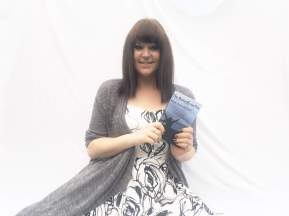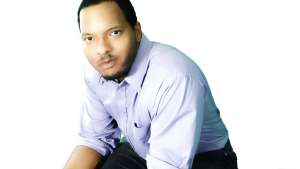 An Interview with Theodore Ficklestein, author of A Day in the Life
An Interview with Theodore Ficklestein, author of A Day in the Life
Theodore Ficklestein is an author, blogger and poet. His books include This Book Needs A Title Volumes 1 and 2 and I Killed the Man Who Wrote This Book. His first novel Day In The Life will be published by Gen Z Publishing in 2017. His multiple blogs include This Blog Needs Sports, This Blog Needs Poetry and This Blog Needs Movies.
Some authors are able to pump out a novel a year and still be filled with inspiration. Is this the case for you, or do you like to let an idea percolate for a couple of years in order to get a beautiful novel?
I have actually been able to produce content out on a regular basis. I self-published my first book in 2013 and have written three books since then, so I am on pace to write a book a year. The only thing that stops me from writing books at a faster pace is focus on my writing elsewhere, like a blog or social media.
I have heard of writers that could only write in one place – then that cafe closed down and they could no longer write! Where do you find yourself writing most often, and on what medium (pen/paper or digital)?
I write in my office and I always write in pen. I try not to put my first draft in digital form. I remember a teacher saying how people are more elaborate in their writing when they actually write it. I tried to type some posts on one of my blogs and felt that there is something to writing it out first. I’m interested if there is a major difference when people write in script compared to print, since script is out of style for most people. I will say that my one requirement when I write is silence. I don’t like to write with music on or while watching tv.
Before going on to hire an editor, most authors use beta-readers. How do you recruit your beta-readers, and choose an editor? Are you lucky enough to have loving family members who can read and comment on your novel?
I don’t use beta readers. I have a few family members that I pitch my ideas to in order to get a readers take on it, even then I only summarize the work. The most I give them is the synopsis of the work and see how they respond to it. I never have anyone besides the editor manually look it over. I’m not really crazy about people (who are not the editor) criticizing my work before it is released. People will do that anyway, so I might as well stay as close to my original story as I can.
I walk past bookshops and am drawn in by the smell of the books – ebooks simply don’t have the same attraction for me. Does this happen to you, and do you have a favourite bookshop? Or perhaps you are an e-reader fan… where do you source most of your material from?
I have a Barnes and Noble by me that I love to go to. When I visit I normally have an idea on when I want to go because there is a book that I am looking for, but I still go to the literature fiction section to browse afterwards.
I used to find myself buying books in only one genre (fantasy) before I started writing this blog. What is your favourite genre, and do you have a favourite author who sticks in your mind from your different life stages?
I like the classics. I find an author and try to read all of their work. If I have not read any of the author, I cover their main stuff first. I like reading the unknown from the classic writers. That is where it is fun for me as a reader and I learn of stories that sometimes the writer never even intended on publishing.
Social media is a big thing, much to my disgust! I never have enough time myself to do what I feel is a good job. What do you do?
I manage the content I put up on all my social media accounts. I have found a company that helps with finding suitable followers for one of those accounts. I try to put out enough so people know I am doing something, but not too much where it takes too much of my time. It is a balancing act.
Answering interview questions can often take a long time! I try to make my questions as interesting as possible, is there anything else you wished I had asked? And tell me honestly… Are you ever tempted to recycle your answers from one to the next?
Perhaps something about where literature is going or a silly question, like if I could go to outer space with any author who would it be? I am tempted to copy and paste some of my answers for interviews, but I answer them honestly and if a bunch of interviewers ask the same question, I give them all the same answer because that is the only answer. For example, a lot of interviewers ask about my reading habits and I tell them all the same answer, classics, because that is what is in my library right now.
A post through Roger Charlie Book Promotions.









 An Interview with Emi Louise Croucher (Part 2), author of The Butterfly on Fire
An Interview with Emi Louise Croucher (Part 2), author of The Butterfly on Fire
 An Interview with Emi Louise Croucher (Part 1), author of The Butterfly on Fire
An Interview with Emi Louise Croucher (Part 1), author of The Butterfly on Fire
 An Interview with E. A. Barker, author of Ms. Creant: The Wrong Doers!
An Interview with E. A. Barker, author of Ms. Creant: The Wrong Doers! An Interview with Mita Balani
An Interview with Mita Balani
 An Interview with Charles McCormack, author of
An Interview with Charles McCormack, author of  Before going on to hire an editor, most authors use beta-readers. How do you recruit your beta-readers, and choose an editor? Are you lucky enough to have loving family members who can read and comment on your novel?
Before going on to hire an editor, most authors use beta-readers. How do you recruit your beta-readers, and choose an editor? Are you lucky enough to have loving family members who can read and comment on your novel?
 Before going on to hire an editor, most authors use beta-readers. How do you recruit your beta-readers, and choose an editor? Are you lucky enough to have loving family members who can read and comment on your novel?
Before going on to hire an editor, most authors use beta-readers. How do you recruit your beta-readers, and choose an editor? Are you lucky enough to have loving family members who can read and comment on your novel?
 I have heard of writers that could only write in one place – then that cafe closed down and they could no longer write! Where do you find yourself writing most often, and on what medium (pen/paper or digital)?
I have heard of writers that could only write in one place – then that cafe closed down and they could no longer write! Where do you find yourself writing most often, and on what medium (pen/paper or digital)?
 I tend to write three novels a year. One, ‘The White Building: A Broken Utopian Dream’, was written in 22 days. The book was based on research work carried out by a great friend of mine. Set in Phnom Penh, the White Building is known as ‘the last slum in the City’. Jo wrote a short article for a news station and showed me her notes. I told her that her research was worthy of more than a 2,000 word editorial, and would make a fantastic novel. I challenged her to write the book. A month later, she told me she could never write a novel, and offered the task to me. Armed with her notes, the pair of us went to Phnom Penh to visit the Building for a long weekend. I was so moved by the place, that the story flooded to me. On the journey back on the bus, I was reciting the plot to Jo. By the time we arrived home, the entire story was flowing.
I tend to write three novels a year. One, ‘The White Building: A Broken Utopian Dream’, was written in 22 days. The book was based on research work carried out by a great friend of mine. Set in Phnom Penh, the White Building is known as ‘the last slum in the City’. Jo wrote a short article for a news station and showed me her notes. I told her that her research was worthy of more than a 2,000 word editorial, and would make a fantastic novel. I challenged her to write the book. A month later, she told me she could never write a novel, and offered the task to me. Armed with her notes, the pair of us went to Phnom Penh to visit the Building for a long weekend. I was so moved by the place, that the story flooded to me. On the journey back on the bus, I was reciting the plot to Jo. By the time we arrived home, the entire story was flowing. An Interview with Kristi Saare Duarte, author of Transmigrant
An Interview with Kristi Saare Duarte, author of Transmigrant